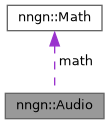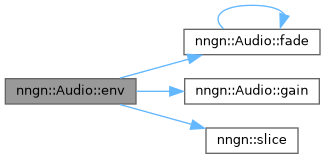#include <audio.h>

Public Types | |
| enum class | source : std::size_t |
Public Member Functions | |
| Audio (void)=default | |
| ~Audio (void) | |
| bool | init (Math *m, std::size_t rate) |
| Initializes the manager to work with a given sample rate. | |
| std::size_t | rate (void) const |
| std::size_t | n_sources (void) const |
| bool | read_wav (std::string_view path, std::vector< std::byte > *v) const |
| Reads WAV data from a file. | |
| bool | write_wav (FILE *f, std::span< const std::byte > s) const |
| Writes WAV data to a file. | |
| void | gen_wav_header (std::span< std::byte > dst, std::span< const std::byte > src) const |
| Generates WAV header for a buffer. | |
| std::vector< std::byte > | gen_wav (std::span< const float > s) const |
| Generates a WAV file from floating-point data. | |
| void | trem (std::span< float > s, float a, float freq, float mix) const |
Applies a tremolo effect with amplitude a and frequency f. | |
| void | gen_sine (std::span< float > s, float freq) const |
Generates a sine wave with amplitude 1 and frequency freq. | |
| void | gen_sine_fm (std::span< float > s, float freq, float lfo_a, float lfo_freq, float lfo_d) const |
| Generates a sine wave with frequency modulation. | |
| void | gen_square (std::span< float > s, float freq) const |
Generates a square wave with amplitude 1 and frequency freq. | |
| void | gen_saw (std::span< float > s, float freq) const |
Generates a saw-tooth wave with amplitude 1 and frequency freq. | |
| void | gen_noise (std::span< float > s) const |
| Generates white (random) noise. | |
| bool | set_pos (vec3 p) |
| source | add_source (void) |
| source | add_source (std::span< const std::byte > v) |
| bool | remove_source (source s) |
| vec3 | source_pos (source s) const |
| std::size_t | source_sample_pos (source s) const |
| bool | set_source_data (source s, std::size_t channels, std::size_t bit_depth, std::span< const std::byte > v) |
| bool | set_source_pos (source s, vec3 p) |
| bool | set_source_sample_pos (source s, std::size_t p) |
| bool | set_source_loop (source s, bool l) |
| bool | set_source_gain (source s, float g) |
| bool | play (source s) const |
| bool | stop (source s) const |
Static Public Member Functions | |
| static constexpr float | db (float x) |
| Multiplier to decibel conversion. | |
| static void | gain (std::span< float > s, float g) |
| Applies the gain multiplier to each element. | |
| static void | over (std::span< float > s, float m, float mix) |
Applies an overdrive effect with input multiplier m. | |
| static void | fade (std::span< float > s, float g0, float g1) |
Linearly fades from g0 to g1. | |
| static void | exp_fade (std::span< float > s, std::size_t ep, float g0, float g1, float exp) |
Exponentially fades from g0 to g1. | |
| static void | env (std::span< float > s, std::size_t a, std::size_t d, float st, std::size_t r) |
| Attack/decay/sustain/release envelope. | |
| static void | mix (std::span< float > dst, std::span< const float > src) |
| Adds the samples from both buffers. | |
| static void | normalize (std::span< i16 > dst, std::span< const float > src) |
| Generates 16-bit PCM data from floating-point data. | |
Private Member Functions | |
| bool | init_openal (void) |
Private Attributes | |
| std::unique_ptr< void, void(*)(void *)> | data = {nullptr, [](auto){}} |
| Math * | math = nullptr |
| std::size_t | m_rate = 0 |
Detailed Description
Audio manager.
Generates, stores, and controls audio streams.
Member Enumeration Documentation
◆ source
|
strong |
Constructor & Destructor Documentation
◆ Audio()
|
default |
◆ ~Audio()
| nngn::Audio::~Audio | ( | void | ) |
Member Function Documentation
◆ add_source() [1/2]
| auto nngn::Audio::add_source | ( | std::span< const std::byte > | v | ) |
◆ add_source() [2/2]
| auto nngn::Audio::add_source | ( | void | ) |
◆ db()
Multiplier to decibel conversion.
◆ env()
|
static |
Attack/decay/sustain/release envelope.

◆ exp_fade()
|
static |
Exponentially fades from g0 to g1.
The interpolation is done in reverse (i.e. 1 - ((1 - x) ^ e) in case g1 < g0 so that the same exponent generates similar curves when fading either in or out. ep is the real end position, which has to satisfy s.size() <= ep.

◆ fade()
Linearly fades from g0 to g1.


◆ gain()
Applies the gain multiplier to each element.

◆ gen_noise()
| void nngn::Audio::gen_noise | ( | std::span< float > | s | ) | const |
Generates white (random) noise.

◆ gen_saw()
Generates a saw-tooth wave with amplitude 1 and frequency freq.
◆ gen_sine()
Generates a sine wave with amplitude 1 and frequency freq.
◆ gen_sine_fm()
| void nngn::Audio::gen_sine_fm | ( | std::span< float > | s, |
| float | freq, | ||
| float | lfo_a, | ||
| float | lfo_freq, | ||
| float | lfo_d ) const |
Generates a sine wave with frequency modulation.
- Parameters
-
lfo_a Amplitude of the message signal. lfo_freq Frequency of the message signal. lfo_d Phase delta (i.e. angular displacement, in radians) to apply to the message signal.
◆ gen_square()
Generates a square wave with amplitude 1 and frequency freq.
◆ gen_wav()
◆ gen_wav_header()
| void nngn::Audio::gen_wav_header | ( | std::span< std::byte > | dst, |
| std::span< const std::byte > | src ) const |
Generates WAV header for a buffer.


◆ init()
| bool nngn::Audio::init | ( | nngn::Math * | m, |
| std::size_t | rate ) |
Initializes the manager to work with a given sample rate.
Must be called before any other non-static member function.
- Parameters
-
m May be nullif noise is never called.

◆ init_openal()
|
private |


◆ mix()
Adds the samples from both buffers.

◆ n_sources()
| std::size_t nngn::Audio::n_sources | ( | void | ) | const |
◆ normalize()
Generates 16-bit PCM data from floating-point data.

◆ over()
Applies an overdrive effect with input multiplier m.

◆ play()
◆ rate()
|
inline |

◆ read_wav()
| bool nngn::Audio::read_wav | ( | std::string_view | path, |
| std::vector< std::byte > * | v ) const |
◆ remove_source()
◆ set_pos()
◆ set_source_data()
| bool nngn::Audio::set_source_data | ( | source | s, |
| std::size_t | channels, | ||
| std::size_t | bit_depth, | ||
| std::span< const std::byte > | v ) |
◆ set_source_gain()
◆ set_source_loop()
◆ set_source_pos()
◆ set_source_sample_pos()
◆ source_pos()
◆ source_sample_pos()
| std::size_t nngn::Audio::source_sample_pos | ( | source | s | ) | const |
◆ stop()
◆ trem()
Applies a tremolo effect with amplitude a and frequency f.

◆ write_wav()
Member Data Documentation
◆ data
|
private |
◆ m_rate
|
private |
◆ math
|
private |
The documentation for this class was generated from the following files:
- src/audio/audio.h
- src/audio/audio.cpp
- src/audio/gen.cpp
- src/audio/openal.cpp



